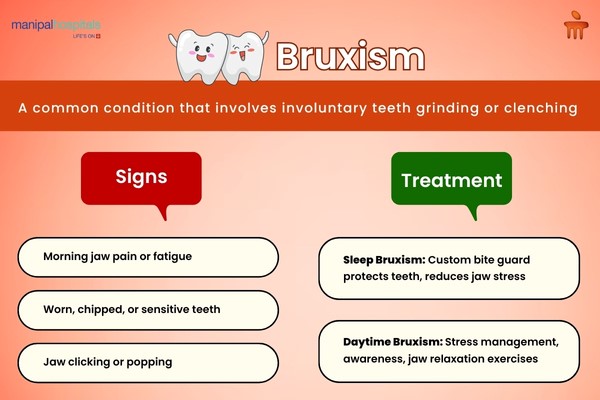.png)
Do you ever wake up with jaw pain or notice yourself clenching your teeth during the day? You could be dealing with bruxism - a common condition that involves teeth grinding or clenching, which you may not even realize. If you don’t address the condition, it can cause other dental issues. In this blog, let’s break down what bruxism is, why it happens, and what you can do to manage it.
Synopsis
What is Bruxism?
Bruxism is basically the habit of grinding or clenching teeth. It can happen during the day when you're awake or when you're asleep at night. Many people are often unaware that they have it until they start experiencing discomfort in their mouth or jaw, or their dentist notices signs of wear on their teeth.
Types of Bruxism
1. Sleep Bruxism
This happens while you're asleep. Since you’re unaware of it, it can go unnoticed for a long time. However, sleep bruxism can cause:
-
Morning jaw pain or stiffness
-
Tired or sore jaw muscles
-
Clicking or popping sounds from the jaw
-
Worn-down or sensitive teeth
During sleep, the pressure from grinding can be several times stronger than when you're awake, which can lead to serious wear and tear over time and predispose you to Temporomandibular Joint (TMJ) Dysfunction.
2. Daytime Bruxism
This occurs even when you're awake, and that’s why this has a better chance at diagnosis. It may happen during scenarios like:
-
Stress or anxiety
-
Deep concentration (while working or studying)
-
Frustration or anger
You might catch yourself clenching your jaw or grinding your teeth without realising it. The good news? Once you become aware of the habit, you can take steps to control it.
Read our Blog: Stress Symptoms - 7 Stress Management Techniques
Who is Affected by Teeth Grinding?
Bruxism is surprisingly common in children and young adults, but it tends to become less frequent with age. It's also very rare among the elderly population above 65 years of age. Stress, lifestyle, and even sleep disorders can increase the chances of developing bruxism at any age.

Signs That May Indicate Bruxism
Not sure if you're grinding your teeth? Below are some common signs of bruxism:
-
Jaw pain or fatigue in the morning
-
Teeth that appear worn down, chipped, or flattened
-
Increased tooth sensitivity
-
Clicking or popping in the jaw
If you're noticing any of these symptoms, it’s always a good idea to check in with a top Oral Medicine Specialist in Bangalore.
Bruxism Treatment
The most common treatment for sleep bruxism is a bite guard or dental splint. This is a custom-made device you can wear over your upper or lower teeth at night. Although it doesn’t stop the grinding, it:
-
Protects your teeth from damage
-
Reduces pressure on your jaw joints (TMJ)
Treatment for daytime bruxism often focuses on stress management, behavioural awareness, and jaw relaxation techniques. Some people may also benefit from physical therapy or relaxation exercises.
Visit the dental medicine department in Manipal Hospital, Old Airport Road, for expert treatment for Bruxism.
Conclusion
Bruxism can be painful and damaging if left untreated, but there are effective ways to manage the condition. Whether it’s wearing a bite guard at night or practising stress relief during the day, small changes can make a big difference.
For a personalised evaluation and treatment plan, consult with an experienced dental surgeon in Bangalore.
FAQ's
Many children naturally stop grinding their teeth as they age, especially when the habit is linked to baby teeth. However, it’s important for parents to monitor such behaviors. If it continues into teenage years or starts to affect their teeth or sleep, visiting a dentist is the smart move.
Yes, this is often linked to sleep disorders like sleep apnea and emotional conditions such as anxiety or chronic stress. If you’re grinding your teeth and have trouble sleeping or feel anxious regularly, treating the underlying issue can go a long way in reducing the grinding.
Over-the-counter mouthguards can help in mild cases, but they often don’t fit well and may feel bulky or uncomfortable. A custom-fitted night guard from your dentist offers a better fit, more comfort, and better long-term protection for your teeth, especially if you grind heavily during sleep.
Yes, diet plays a role. Stimulants like caffeine, chocolate, and alcohol can worsen teeth grinding, especially when consumed late in the day. Try to avoid these close to bedtime. A calming evening routine and a light, non-stimulating diet may help reduce nighttime jaw tension and clenching.





















 4 Min Read
4 Min Read














